Related Research Articles
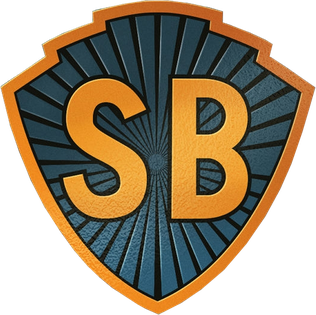
Shaw Brothers (HK) Limited was the largest film production company in Hong Kong, operating from 1925 to 2011.
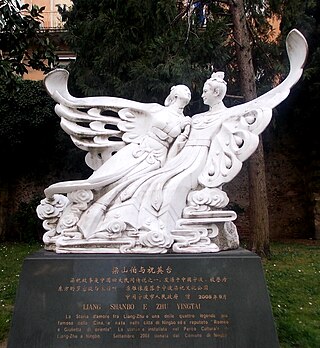
The Butterfly Lovers is a Chinese legend centered around the tragic romance between Liang Shanbo (梁山伯) and Zhu Yingtai (祝英臺), whose names form the Chinese title of the story. The title is often abbreviated as Liang Zhu (梁祝).
Liang is an East Asian surname of Chinese origin. The surname is often transliterated as Leung or Leong according to its Cantonese and Hakka pronunciation, Neo / Lio / Niu, or Liong (Fuzhou). In Indonesia, it is known as Liong or Nio. It is also common in Korea, where it is written Yang (양) or Ryang (량). In Vietnam, it is pronounced as Lương.

Cài is a Chinese-language surname that derives from the name of the ancient Cai state. In 2019 it was the 38th most common surname in China, but the 9th most common in Taiwan, where it is usually romanized as "Tsai", "Tsay", or "Chai" and the 8th most common in Singapore, where it is usually romanized as "Chua", which is based on its Teochew and Hokkien pronunciation. Koreans use Chinese-derived family names and in Korean, Cai is 채 in Hangul, "Chae" in Revised Romanization, It is also a common name in Hong Kong where it is romanized as "Choy", "Choi" or "Tsoi". In Macau, it is spelled as "Choi". In Malaysia, it is romanized as "Choi" from the Cantonese pronunciation, and "Chua" or "Chuah" from the Hokkien or Teochew pronunciation. It is romanized in the Philippines as "Chua" or "Chuah", and in Thailand as "Chuo" (ฉั่ว). Moreover, it is also romanized in Cambodia as either "Chhay" or "Chhor" among people of full Chinese descent living in Cambodia and as “Tjhai”, "Tjoa" or "Chua" in Indonesia.

Kenneth Bi is a Hong Kong-born Canadian filmmaker. He has written, directed, and acted in Canada and Hong Kong in numerous theatre and film productions.
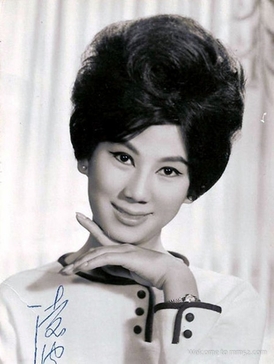
Huang Yuet-chu, professionally known by her stage name Ivy Ling Po, is a retired actress and Chinese opera singer from Hong Kong. She gained widespread fame during the 1960s for her roles in several popular Huangmei opera films, most notably The Love Eterne (1963), which propelled her towards fame across Asia. Her role in the film is considered an inspiring performance to Asian culture, solidifying her status as a cultural icon.

The Empress Dowager is a 1975 Hong Kong historical film directed by Li Han-hsiang and produced by the Shaw Brothers Studio, starring Lisa Lu as Empress Dowager Cixi.
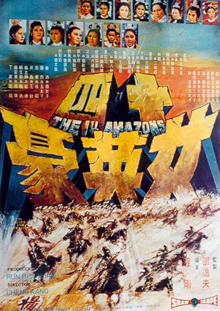
The 14 Amazons is a 1972 Hong Kong wuxia film directed by Cheng Kang and produced by the Shaw Brothers Studio. The award-winning film featured a predominantly female cast. The story is about the female generals of the Yang Family.
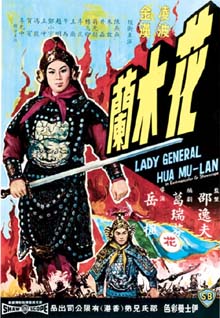
Lady General Hua Mu-lan is a 1964 Hong Kong Huangmei opera musical film, directed by Yueh Feng, depicting the story of Hua Mulan.

Inside The Forbidden City is a 1965 Hong Kong Huangmei opera musical film. Depicted is the famous tale known as "Civet for Crown Prince" which allegedly took place in China's Song dynasty.

Helen Liang Memorial Secondary School (Shatin) (HLMSS, Chinese: 梁文燕紀念中學(沙田)) is a secondary school in Sha Tin, Hong Kong. The primary school division was founded in 1961, while the secondary school division was founded in 1977 and relocated to the current site of Sha Tin in 1988.

The Female Prince is a 1964 Shaw Brothers Studio Hong Kong Huangmei opera musical film directed by Chow Sze-Loke, written by Chang Cheh and starring Ivy Ling Po.
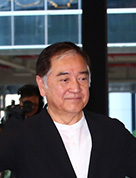
Paul Chun is a Hong Kong actor. He has appeared in more than 130 films and television series since 1949. In 1966, he appeared in The Sand Pebbles, an American film produced and directed by Robert Wise.

The Last Tempest is a 1976 Hong Kong drama film directed by Li Han-hsiang. The film was selected as the Hong Kong entry for the Best Foreign Language Film at the 49th Academy Awards, but was not accepted as a nominee.
Ling is a surname which can be of either Chinese, English, or Nordic origin.
Events in the year 1946 in the Republic of China. This year is numbered Minguo 35 according to the official Republic of China calendar.

Duel for Gold is a 1971 Hong Kong martial arts film directed by Chor Yuen and produced by Shaw Brothers Studio, starring Ivy Ling Po, Lo Lieh, Chin Han, Wang Ping, Tsung Hua and Chen Chun. The screenplay was written by Ni Kuang.

The Love Eterne is a 1963 Hong Kong musical film of the Huangmei opera genre directed by Li Han Hsiang. An adaptation of the Chinese legend of the Butterfly Lovers, it tells of the doomed romance between the male Liang Shanbo and the cross-dressed female Zhu Yingtai.
References
- ↑ Wang Tsu-shou (5 December 2002). 迎凌波 大哥大超大排場 [To Welcome Ivy Ling Po, Variety Big Brother Had Huge Show]. Min Sheng Bao (in Chinese). Archived from the original on 12 August 2014. Retrieved 11 August 2014.
- 1 2 3 我愛梁兄哥-凌波的魅力 [I Love "Big Brother Liang": Ivy Ling Po's Charisma] (in Chinese). Chinese Taipei Film Archive.
- 1 2 Nien Chang-yu; Liang Yu-fang (29 March 2005). 深情梁兄哥 40年只愛金大聲 [Devoted "Big Brother Liang" Only Loved "Loud-Voiced Chin" in 40 Years]. United Daily News (in Chinese).
- ↑ Lawrence Cheng (9 May 2009). Home Sweet Home (talk show) (in Chinese). now Hong Kong.
- ↑ "Song of Tomorrow". hkmdb.com. 12 October 1967. Retrieved 17 July 2021.